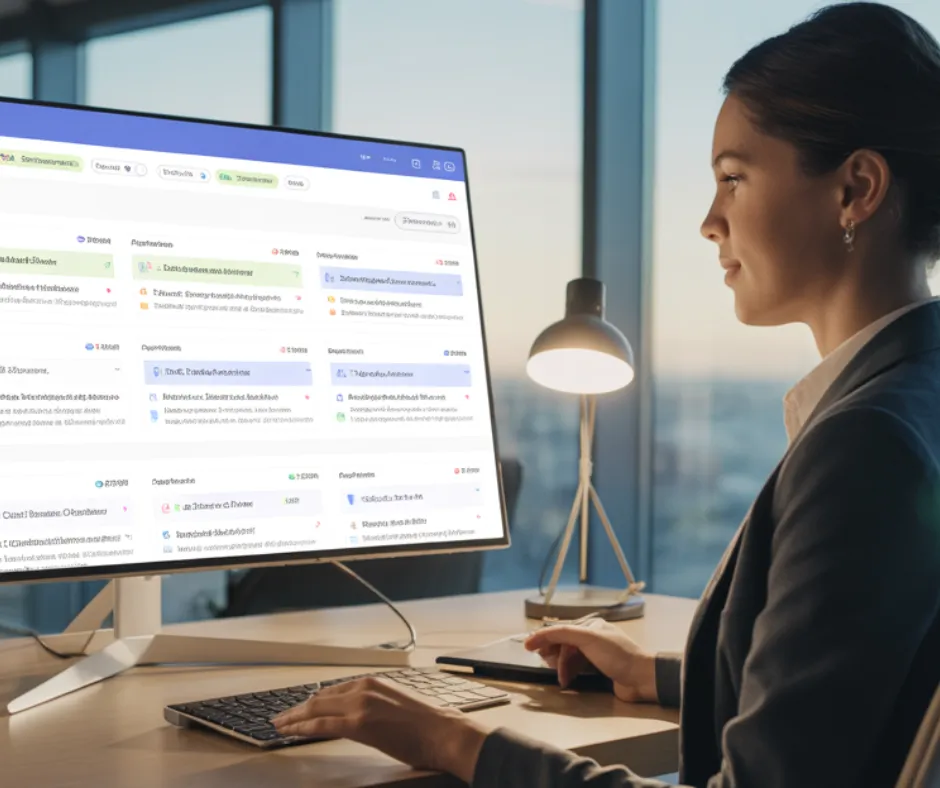Blog

The Lead Generation Tactic Most Business Owners Are Missing
The Lead Generation Tactic Most Business Owners Are Missing
If you're like many small business owners, lead generation can often feel like shouting into the void.
You've got the website. You're sending out emails. You might even be dabbling in social media. But despite all that effort, the results just aren't what they should be. People visit your site, then disappear. Emails get opened but not replied to. You're left wondering if it's you... or if everyone else just has some secret you haven't discovered yet.
Here's the truth most marketers won't tell you: it's not about doing more. It's about doing things smarter. And one of the smartest, most underused tactics out there is this — adding short, purposeful surveys to your website and marketing.
Not long forms. Not endless tick boxes. Just a few well-placed questions that open the door to better conversations, stronger relationships, and more qualified leads.
In this article, we're going to look at why surveys are the hidden gem of lead generation, how they can be used without sounding like a hard sell, and how — when connected to your CRM — they can do the heavy lifting for you, even while you sleep.
Why Surveys Work for Lead Generation
Most people don't land on your website ready to buy. They're curious, cautious, and often just having a browse. Traditional lead capture tactics — like "Download Our Brochure" or "Get in Touch" — rely on the visitor taking the first step. But be honest: how often does that actually happen?
This is where surveys make a difference.
Instead of asking people to jump straight into your world, you invite them into a conversation. A short, simple set of questions can do more than gather data — it builds trust. It shows you care about their needs, not just your sale.

Surveys are powerful because they remove pressure. They're not a sales pitch. They're an invitation to share. And people love to talk about their challenges — especially when they feel someone might actually be able to help.
Even better, surveys give you context. You're no longer working in the dark, trying to guess what your audience wants. You're hearing it directly from them — in their own words — and using that insight to follow up with something genuinely relevant.
That shift alone can transform how your leads respond.
No hard sell. No one-size-fits-all pitch. Just meaningful, human-led engagement that naturally leads to better conversations — and ultimately, better conversions.
The Pains Surveys Help Solve
Wasted Time - Stop chasing the wrong leads and focus on prospects who have already shown interest through their survey responses.
Ineffective Campaigns - Replace guesswork with actual customer insights to create marketing that resonates with your audience.
Low Engagement - Transform passive visitors into active participants by giving them a voice through well-crafted questions.
If you've ever felt like your marketing is falling on deaf ears, you're not alone. For many small business owners, the biggest frustration isn't just the lack of leads — it's the waste. Time wasted chasing the wrong people. Money wasted on campaigns that don't convert. And energy drained by doing all the "right" things with none of the results.
Surveys help break that cycle.
Starting with your website. You might have a decent amount of traffic, but what happens next? Most visitors skim, click around, then leave — often without a trace. By adding a short, conversational survey — even something as simple as "What brought you here today?" — you can instantly turn passive visitors into active participants. You create a moment of connection.
The same applies to email. Open rates might be okay, but replies? Engagement? Actual leads? That's another story. Adding a survey to your emails can reignite the conversation. It gives your audience a reason to respond — not with "unsubscribe," but with insight. They tell you what they're struggling with, what they need, and what they're looking for. That's gold dust.
And what about your sales process? If you've ever spent half an hour on a call only to realise the person was never a good fit, you know how draining that is. Surveys let you qualify leads before they land in your inbox. You can find out what budget they have, what timeline they're working to, and whether your solution matches their goals — all before you've even spoken.
Surveys help you stop guessing. They replace assumptions with answers. And when you've got better insight, you make better decisions — about your marketing, your messaging, and your time.
Where and How to Use Surveys in Your Marketing
When it comes to using surveys, timing and placement are everything. Get it right, and you create a seamless part of the customer journey — one that feels natural, helpful, and even enjoyable. Get it wrong, and it becomes just another form people ignore.
So where should you use surveys? Start with your website.
Your homepage is prime real estate. It's where most people land, and also where most people leave. A short, friendly survey can change that. Try something like: "What are you hoping to find today?" It creates an opportunity for interaction before the visitor disappears.
You can also add surveys to key service pages. If someone is browsing a particular offer or product, that's your chance to find out what caught their eye — or what's holding them back. It's not about being intrusive. It's about offering to help.
Then there's email. A lot of small businesses treat email as a one-way broadcast: "Here's what we've got. Take it or leave it." But what if you used email to ask instead of tell?
Imagine sending a message that says: "Quick question — what's your biggest challenge right now?" That one line could unlock more engagement than any sales pitch ever could. It gives your readers a voice. And that voice becomes insight.
You don't need to over-engineer it. A few well-placed questions — presented at the right time and in the right tone — can become a natural part of how you connect with potential customers. And when they're answered, your CRM captures the detail. Your automation takes over. And suddenly, it feels like your business is working smarter, not harder.
What to Ask: Crafting the Right Questions

Writing a survey might sound simple, but asking the right questions can be the difference between just collecting data and actually generating leads.
Start by thinking about what you really want to know. Not from a sales point of view — but from a human one. What would help you better understand the people visiting your website or opening your emails?
One of the most effective questions is also the most straightforward: "What's your biggest challenge right now?" It's open, it's easy to answer, and it gives you insight you can act on immediately. It tells you what matters most to that person — and gives you a chance to respond with something genuinely useful.
Another great option: "Have you tried to solve this before?" This helps you understand where they are in their journey. Are they new to the problem? Frustrated with past attempts? Actively looking for help?
If your business offers different services or solutions, a simple "What are you most interested in?" can guide them to the right place — and help you segment them properly in your CRM.
And then there's the qualifying question: "Would you like personalised advice or a free resource based on your answers?" This is your soft gateway into lead capture. If they say yes, they're ready to engage — and you can confidently ask for their name, email, or phone number without it feeling pushy.
The key is to keep it conversational. Keep it short. And always give something in return — even if it's just the promise of a relevant reply or a useful next step.
Turning Survey Responses into Qualified Leads

Getting someone to complete a survey is a win — but what you do with their answers is where the magic happens.
A well-crafted survey isn't just about collecting information; it's about creating momentum. You're taking someone who was passively browsing or skimming an email and giving them a reason to engage. Now it's time to turn that engagement into action.
The best place to start? Offer something of value in return for their final step — their contact details. It doesn't have to be complicated. A tailored resource, a quick-win guide, a free 15-minute consultation — anything that's relevant to what they've just shared. The more personalised, the better.
For example, if someone's told you they're struggling with marketing automation, don't send them your generic brochure. Send them a quick guide on automating customer follow-up. If they've shown interest in your most popular service, send them a case study that shows how you've helped someone like them.
This is where your CRM really shines. When your survey is connected directly to it, each response can be tagged, categorised, and used to trigger follow-up instantly. No spreadsheets. No back and forth. Just smooth, timely communication that keeps your business top of mind.
Here's the beauty of it — you're no longer sending cold follow-ups or vague emails. You're responding to real problems with real solutions. That builds trust. And trust turns leads into customers.
Surveys + CRM = Automated Follow-Up That Converts

Take this example - someone visits your website, answers a few quick questions about what they need, and then... you do nothing.
Not because you've forgotten. But because everything is already in motion — automatically.
That's the power of connecting your survey directly to your CRM. It's not just about collecting answers. It creates a smart, seamless system that takes action on your behalf. No missed leads. No delay. No manual chasing.
For example, someone completes your survey and shares that they're looking for help with social media strategy. Within seconds, your CRM can tag that contact as interested in marketing support, trigger an email with a relevant case study, send an SMS checking if they'd like to book a free discovery call — and even starts a WhatsApp chat with a pre-written message that feels personal and direct.
This isn't just automation for automation's sake. It's meaningful, multi-channel communication — delivered in the way your audience actually prefers.
Timing matters more than ever right now, in fact I would say it's crucial. Most leads go cold not because they weren't interested, but because the follow-up came too late — or didn't feel relevant. With a CRM-powered survey setup, your business responds in real-time, with exactly the right message, through the right channel.
Email works. SMS grabs attention. WhatsApp starts real conversations. And when they're all working together, your brand doesn't just follow up — it shows up.
This is where small businesses gain a serious edge. You no longer need a huge team or complex tech stack. With the right tools (like Nexus 360), you can create a fully automated lead generation engine that feels personal, timely, and incredibly effective — every single time.
Real-World Example: From Passive Traffic to Qualified Conversations
One of our clients — a local consultancy supporting SME growth — had what many small businesses face: a decent website, some regular traffic, but barely any leads.
Their "Contact Us" form sat quietly at the bottom of the page, doing absolutely nothing. No engagement. No interaction. No real value.
We helped them replace it with something far more effective — a short, guided survey placed right on the homepage. But here's the important part: each question had multiple-choice responses and scoring built in. This meant the survey didn't just collect information — it gave something back to the user.

At the end of the survey, users were shown a short results summary based on their answers — a score that reflected how well-positioned they were for growth, along with practical recommendations tailored to their situation. For some, it triggered a moment of urgency. For others, it gave peace of mind that they were on the right track.
The responses were instantly captured in their Nexus 360 CRM, which kicked off personalised follow-up based on the score range. Those with lower scores received helpful resources. Those scoring higher were flagged as warm leads and offered a discovery call — via email and WhatsApp.
The result?
A 200% increase in engagement
A 42% rise in call bookings within 30 days
And more importantly — a sense of momentum. Leads weren't just trickling in, they were arriving pre-qualified and ready to talk.
Here we added more than presenting a visitor with a form, we created a useful experience that gives the user something of value — and gives your business the insights it needs to follow up smarter.
Ask, Don't Assume

When you're running a business, it's easy to get caught up in doing more — more posts, more emails, more promotions — all in the hope that something sticks.
But often, what's really missing isn't volume. It's connection.
Surveys are a simple way to create that connection. Not by shouting louder, but by listening better. They let you stop guessing what your customers want and start asking. They turn your website or email into a two-way conversation. And with the right follow-up in place, they help you guide people from "I'm just looking" to "I'm ready to talk."
You don't need a marketing degree. You don't need a big team. And you certainly don't need another complicated tool you'll forget to use.
You just need to start with one question — and a system that knows what to do with the answer.
That's what makes surveys so powerful. They meet your customers where they are, they give them something useful, and they give you the insight you need to grow — without working harder than you already are.
If you've been stuck wondering why your leads are slow, your follow-ups feel flat, or your website isn't pulling its weight, maybe it's time to stop pushing and start listening.
You might be surprised what people tell you — if you just ask.
(c) Copyright 2026 - Nexus 360| All rights reserved.

